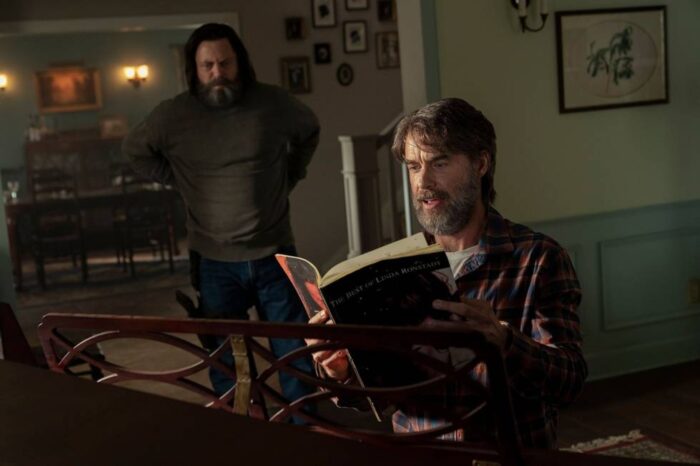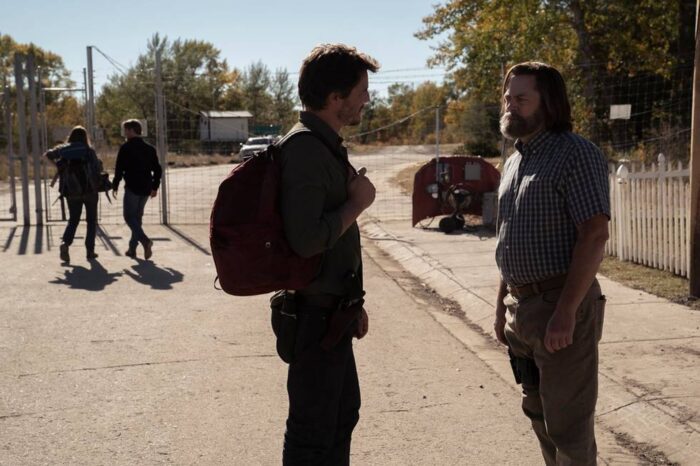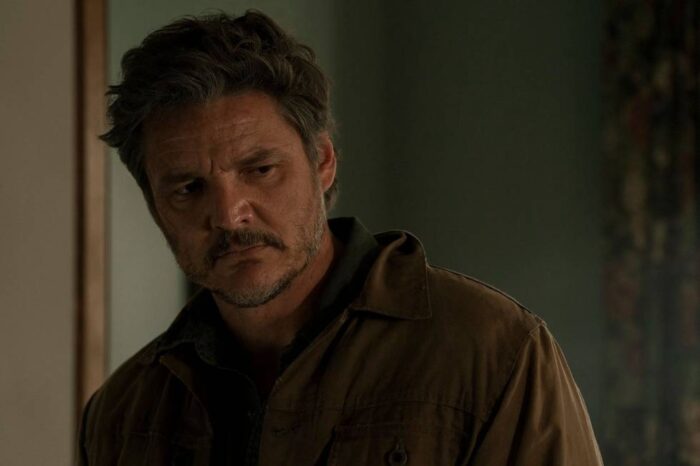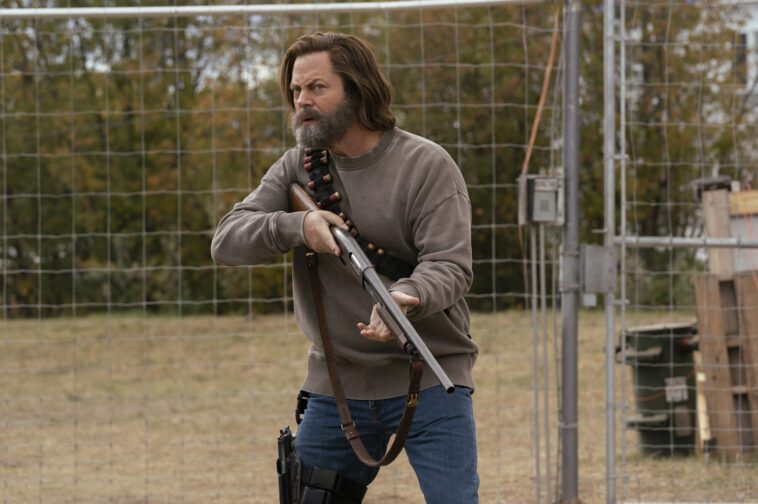The following recap contains spoilers for The Last of Us S1E3, “Long Long Time” (written by Neil Druckmann & Craig Mazin and directed by Peter Hoar)
The first two episodes of The Last of Us were largely praised for their accuracy and dedication to the original video game source material, with the only major exception being the cause of Anna Torv’s death at the end of Episode 2 (“Infected”). That debate between the video game purists and the uninitiated will likely rage again this week as Episode 3, “Long Long Time,” deviates wildly from the game’s canon. Series creators Craig Mazin and Neil Druckmann craft a new backstory about two of the game’s most well-known characters, taking a left turn away from the hordes of infected and the totalitarianism of FEDRA.
But even the staunchest “the game is gospel” advocates would have to agree that “Long Long Time” is one of the most powerful, compelling, and emotional television episodes to come across our screens. Ever. Television analysis and review can be prone to hyperbole and overreaction. It’s quite easy to say “one of the best pilots ever!” or “that goes down as one of the worst television endings of all time!” (looking at you, How I Met Your Mother), but I have been stirring over this episode after I was emotionally floored by it earlier this week.
On my personal Mount Rushmore of greatest single episodes of television, this episode now joins the pilot of Lost, “Ozymandias” from Breaking Bad, and “The Two Cathedrals” from The West Wing. I regret to inform you, Bob Odenkirk, that “Plan and Execution” from Better Call Saul is currently being removed to make room. At least in my opinion, the Pantheon must be updated.

Ever since the end credits rolled on this third episode, its weight has been pushing down on me. It has anything you would want from a perfect episode of television. The backstory for characters Bill and Frank has depth but moves quickly. The dramatic moments are sharp, intense, and meaningful (even in the absence of Clickers or any infected this week). The score composed by Gustavo Santaoalla is beautiful and efficacious, especially during the episode’s build-up to the climax. And Linda Ronstadt may be about to have her Kate Bush moment this week with the exceptional way that her song “Long Long Time” bookends the episode and gives emotional depth to many of the relationships that exist through three episodes.
In the original game, Joel and Ellie introduce us to the survivalist character Bill after Tess dies and they desperately need a car battery. Joel gets Ellie to Bill’s hometown of Lincoln, Massachusetts where they all fight through hordes of Clickers and raiders to secure a battery and a vehicle to get Ellie to the Fireflies and Joel to his brother in Wyoming. Frank is only seen as a corpse in the first game, and we have no sense of background for the character, only that he was Bill’s partner in their own smuggling game, akin to what Tess was for Joel.
In “Long Long Time” almost the entire episode is dedicated to Bill (Nick Offerman), a man with unmatched survivalist skills and severe disdain for the government, and the story of him first capturing, then befriending, and finally falling in love with Frank (Murray Bartlett). All we know of Frank when we first meet him is that he was a transient in the post-apocalyptic world trying to make his way to the Boston Quarantine Zone where he hoped he could find shelter and food. We later learn of his passion for painting, music, beautiful furniture and clothes, and wine. It turns out Bill shares in these passions and they are all drawn to the surface slowly by Frank.
In scenes throughout the course of the 20 years spanned in Episode 3, we see the maturation of their relationship, disagreements about their connection to the rest of humanity, and their willingness to do anything to protect one another. Somewhere in the middle of those 20 years, they meet Joel and Tess and discuss terms of trading, smuggling, and resource-sharing. Bill, ever reluctant of others, begrudgingly accepts this new relationship, but Frank always saw the advantages to the connection. He always thought it best to put our hope in what we can do together.

After many years together, Frank becomes ill. It’s an illness that can’t be treated or minimized in this world without proper doctors or medicine. And instead of becoming a burden in a world full of overwhelming burdens, Frank asks Bill to euthanize him after one last idyllic day together. Bill, now understanding all along why he had these resources and skills (and apparently after reading his Romeo and Juliet), decides to end his own life alongside Frank. Bill admits this by letting Frank know that he is “old and satisfied,” and that Frank was “his purpose.” What’s a life worth living in a broken world once your purpose is no longer present?
It was Frank, it turns out, that was always the one who was able to help Bill see the meaning, beauty, and purpose in everything around them, even when Bill did not want to. In his parting letter to Joel, we learn that Bill “used to hate the world” and that he “was happy when everyone died.” But Frank, he says, helped Bill understand that at least “one person was worth saving.” And if there was one, maybe there are more.
Bill and Joel are alike in that they hate the world around them (for very different reasons), but Bill wants Joel to know that while they may not be best of friends, they are alike. They each stayed alive for a purpose. Bill believes Joel’s purpose is to protect Tess and keep her safe, as he knows nothing about Ellie and nothing about Tess’s death. But with Tess sacrificing herself so Joel and Ellie could survive, Joel begins to realize what he is meant to protect is the hope that Tess left behind. The hope that maybe, just maybe, the key to returning to a normal life is found inside of Ellie.
The genius of casting Pedro Pascal in the role of Joel, and the decision to focus closely on his face while Ellie reads him Bill’s letter is that you can see his opinions, motivations, and desires change in his eyes. To hear Bill’s words while Joel realizes that the person reading them has become his mission is breathtaking.

“That’s why men like you and me are here,” Bill writes in his suicide letter to Joel. Their purpose, contrary to what Bill first thought, should not be just survival. There are people worth saving, and Bill—perhaps the last person we would think—is the one to help Joel realize his purpose in a broken world is to protect someone who can’t protect themselves.
In a world where people have literally turned into monsters and are seeking to destroy the entire race, the protection of others is perhaps the most human thing we can do.

